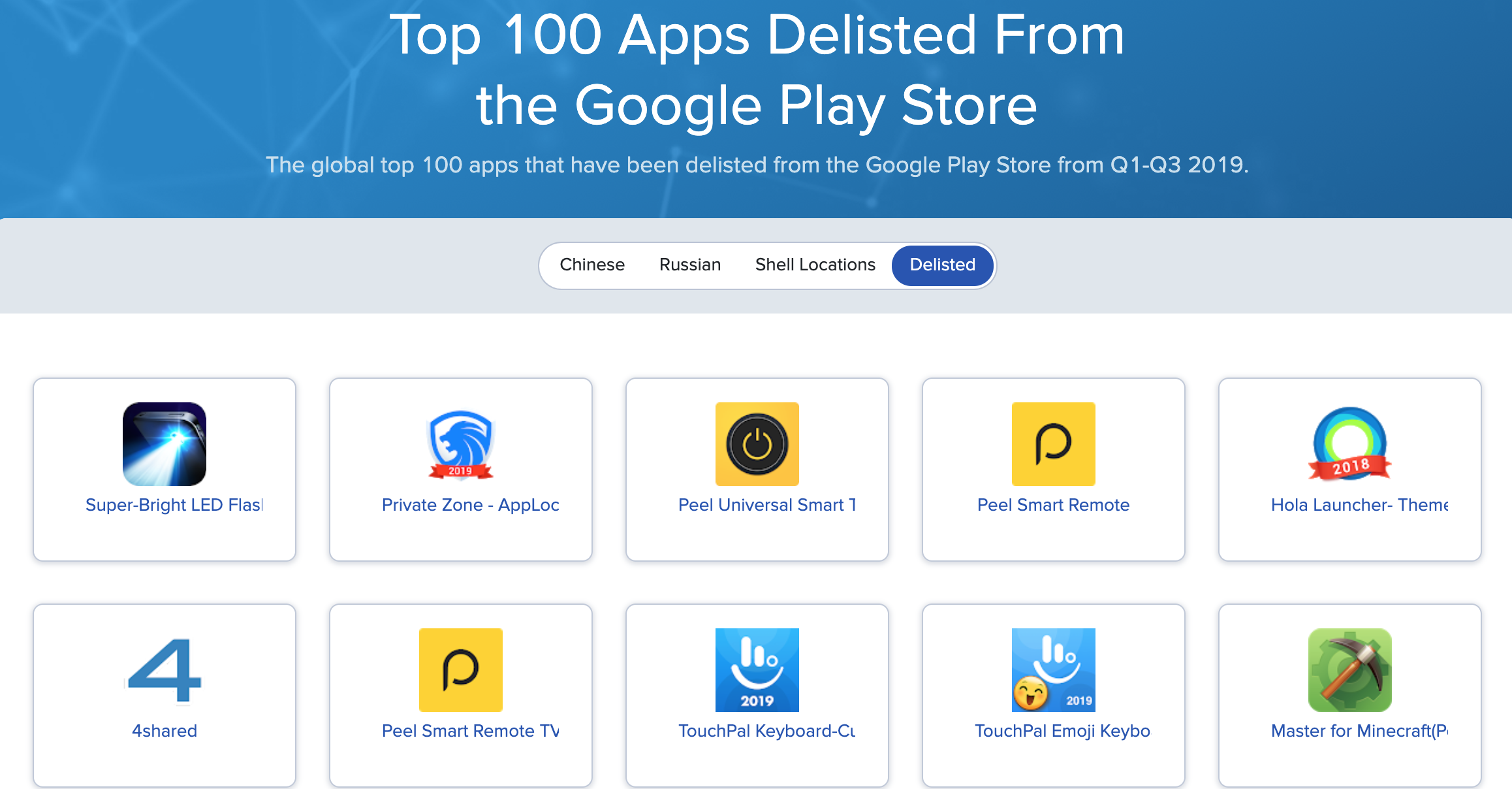
As revealed in our 2019 Mobile Advertising Supply Chain Safety Report, Google delisted over 880,000 apps from the Play Store between Q1 and Q3 2019.
But which delisted apps were the most popular?
Pixalate analyzed Google Play Store apps that were delisted between Q1-Q3 2019 and reviewed which were the most popular based on download volume.
We have published a list of the top 100 apps delisted from the Google Play Store, based on download volume before the apps were delisted.
Note that apps can be delisted for a variety of reasons, and delisted apps cannot reflect the initiator of the delisting action; i.e. Google or the app developer. This list also includes apps delisted as of the last day of Q3 2019; apps are sometimes added back to the Play Store after a period of being delisted.
Download a free copy of the 2019 Mobile Advertising Supply Chain Safety Report to learn more.
Disclaimer
The content of these lists reflects Pixalate's opinions with respect to the factors that Pixalate believes can be useful to the digital media industry. Any proprietary data shared is grounded in Pixalate's proprietary technology and analytics, which Pixalate is continuously evaluating and updating. Any references to outside sources should not be construed as endorsements. Pixalate's opinions are just that, opinions, which means that they are neither facts nor guarantees.
It is important to also note that the mere fact that an app receives "dangerous permissions" (as defined by Google) or is registered in a traditional tax haven country or a country that appears to be receiving heightened scrutiny by, among other governmental bodies, the Committee on Foreign Investment in the United States (CFIUS), does not necessarily mean that such app, or its publisher, is actually exploiting data subjects. Instead, we are merely rendering an opinion that these facts may be suggestive of heightened risks to data subjects.
"Delisted apps" include apps delisted on or after January 1, 2019 and not on the Google Play Store as of September 30, 2019. Delisted apps cannot reflect the initiator of the delisting action, i.e. Google or the app developer.
*By entering your email address and clicking Subscribe, you are agreeing to our Terms of Use and Privacy Policy.
These Stories on Mobile
*By entering your email address and clicking Subscribe, you are agreeing to our Terms of Use and Privacy Policy.

Disclaimer: The content of this page reflects Pixalate’s opinions with respect to the factors that Pixalate believes can be useful to the digital media industry. Any proprietary data shared is grounded in Pixalate’s proprietary technology and analytics, which Pixalate is continuously evaluating and updating. Any references to outside sources should not be construed as endorsements. Pixalate’s opinions are just that - opinion, not facts or guarantees.
Per the MRC, “'Fraud' is not intended to represent fraud as defined in various laws, statutes and ordinances or as conventionally used in U.S. Court or other legal proceedings, but rather a custom definition strictly for advertising measurement purposes. Also per the MRC, “‘Invalid Traffic’ is defined generally as traffic that does not meet certain ad serving quality or completeness criteria, or otherwise does not represent legitimate ad traffic that should be included in measurement counts. Among the reasons why ad traffic may be deemed invalid is it is a result of non-human traffic (spiders, bots, etc.), or activity designed to produce fraudulent traffic.”

